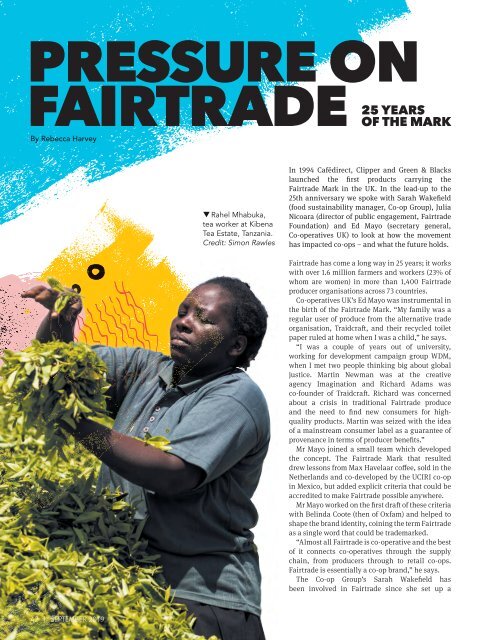Co-op News September 2019: Agriculture
How are co-ops working agriculture?
How are co-ops working agriculture?
Create successful ePaper yourself
Turn your PDF publications into a flip-book with our unique Google optimized e-Paper software.
PRESSURE ON<br />
FAIRTRADE<br />
25<br />
By Rebecca Harvey<br />
YEARS<br />
OF THE MARK<br />
qRahel Mhabuka,<br />
tea worker at Kibena<br />
Tea Estate, Tanzania.<br />
Credit: Simon Rawles<br />
In 1994 Cafédirect, Clipper and Green & Blacks<br />
launched the first products carrying the<br />
Fairtrade Mark in the UK. In the lead-up to the<br />
25th anniversary we spoke with Sarah Wakefield<br />
(food sustainability manager, <strong>Co</strong>-<strong>op</strong> Group), Julia<br />
Nicoara (director of public engagement, Fairtrade<br />
Foundation) and Ed Mayo (secretary general,<br />
<strong>Co</strong>-<strong>op</strong>eratives UK) to look at how the movement<br />
has impacted co-<strong>op</strong>s – and what the future holds.<br />
Fairtrade has come a long way in 25 years; it works<br />
with over 1.6 million farmers and workers (23% of<br />
whom are women) in more than 1,400 Fairtrade<br />
producer organisations across 73 countries.<br />
<strong>Co</strong>-<strong>op</strong>eratives UK’s Ed Mayo was instrumental in<br />
the birth of the Fairtrade Mark. “My family was a<br />
regular user of produce from the alternative trade<br />
organisation, Traidcraft, and their recycled toilet<br />
paper ruled at home when I was a child,” he says.<br />
“I was a couple of years out of university,<br />
working for devel<strong>op</strong>ment campaign group WDM,<br />
when I met two pe<strong>op</strong>le thinking big about global<br />
justice. Martin Newman was at the creative<br />
agency Imagination and Richard Adams was<br />
co-founder of Traidcraft. Richard was concerned<br />
about a crisis in traditional Fairtrade produce<br />
and the need to find new consumers for highquality<br />
products. Martin was seized with the idea<br />
of a mainstream consumer label as a guarantee of<br />
provenance in terms of producer benefits.”<br />
Mr Mayo joined a small team which devel<strong>op</strong>ed<br />
the concept. The Fairtrade Mark that resulted<br />
drew lessons from Max Havelaar coffee, sold in the<br />
Netherlands and co-devel<strong>op</strong>ed by the UCIRI co-<strong>op</strong><br />
in Mexico, but added explicit criteria that could be<br />
accredited to make Fairtrade possible anywhere.<br />
Mr Mayo worked on the first draft of these criteria<br />
with Belinda <strong>Co</strong>ote (then of Oxfam) and helped to<br />
shape the brand identity, coining the term Fairtrade<br />
as a single word that could be trademarked.<br />
“Almost all Fairtrade is co-<strong>op</strong>erative and the best<br />
of it connects co-<strong>op</strong>eratives through the supply<br />
chain, from producers through to retail co-<strong>op</strong>s.<br />
Fairtrade is essentially a co-<strong>op</strong> brand,” he says.<br />
The <strong>Co</strong>-<strong>op</strong> Group’s Sarah Wakefield has<br />
been involved in Fairtrade since she set up a<br />
42 44 | | SEPTEMBER AUGUST <strong>2019</strong> <strong>2019</strong>


















